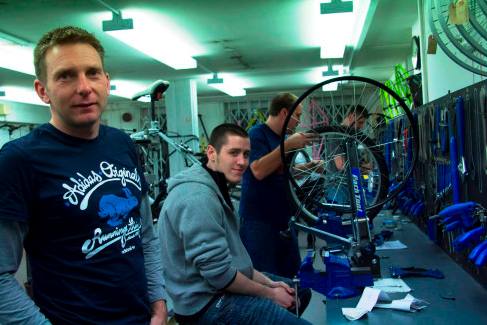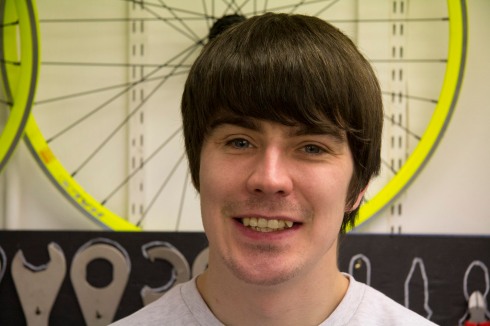Bikeworks
Martin Kitara visits a 360-degree-spinning wheel of cycle goodness at a London social enterprise. //
Bikeworks started trading in 2007 after being registered as a company in 2006. The founding partners Jim Blakemore and Zoe Portlock developed Bikeworks because they saw strong potential for the cycling to make a positive difference to the lives of people from disadvantaged backgrounds. The two partners were joined by Dave Miller who was developing a similar enterprise in the same area of London. After meeting, Jim and Dave decided that they could achieve more by working together and this lead to the growth of the successful business operating today.
Bikeworks delivers its mission through a variety of community cycling programmes including employability for disadvantaged groups, all ability cycling, ReUse and recycling, schools cycle training and much more. As an organization, it provides cycling services to both consumers and organizations.
The company is a social enterprise that uses the ‘bike’ as a tool of engagement to do social good. This is done by running an employability programme that started by specifically engaging with homeless people. The company now works with ex-offenders, long term unemployed and NEETs (not in education, employed or training).
The company works with people, giving them a professional qualification and then getting them into work and has a high success rate of about 50 per cent and about 90 per cent retention throughout the course. This has been aided by cycling being in its growth stage so there are jobs out there which is fundamentally important.
Bikeworks also delivers and works with young people and adults with learning disabilities. The company gets them on adapted bikes, gives them cycling experience and is now trying to start up a disability centre of excellence in the Olympic Park. This is an attempt to offer a legacy programme that will be working with the same client groups at the moment but also trying to get in more health referrals, people with mental ill health. With the bike at its core, it aims to be a wellbeing programme which co-managing director Jim Blakemore is very passionate about.
Jim Blakemore says: “It is stressful running a business but very rewarding. People who work here don’t want to leave – which is a good sign – so that creates a nice employee atmosphere and we are constantly seeing new people come in for the employment stuff, the disability stuff and just seeing a tangible difference.”
In terms of the disability work, he says, “you can get someone who turns up in a wheelchair and can’t walk, you transfer them over into a handcycle or even a recumbent (horizontal bike) and they have enough muscle memory in their legs or enough strength in their arms to just power themselves and that is amazingly powerful; through to having people coming onto our training programme who just find that our tutors and our support and our environment at Bikeworks is exactly what they need to learn a new skill and get back into work.
Bikeworks has helped Jamie McKechnie get his life back on track after a traumatic incident (Pic: Dalston Dave)
Jamie McKechnie who suffered a traumatic brain trauma two years ago after being punched in the head, says Bikeworks has helped him mentally. He has finished five out of eight modules of Bikeworks Level 1 course in bike mechanics and the training staff believe that he will be able to finish.
The success of Bikeworks has come as a result of being business-like, being very open and honest in what it does. The company is not a charity but rather a business with a social mission. Jim Blakemore says the company “has people who understand what it is to make money and that then pushes and drives you forward and then allows you to do all the things you want to.”
For those wanting to start a social enterprise, Jim Blakemore advises that “you need to set up an enterprise with a social mission and vision. There is no harm in getting some level of grant funding to pump prime into starting your business but put a business together that shows a road to sustainability because you don’t want to be chasing grants however good you are.”
















Write Your Comment